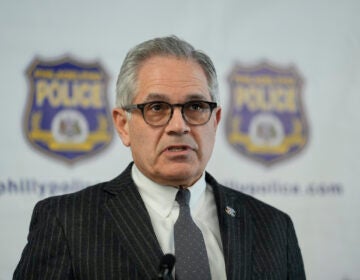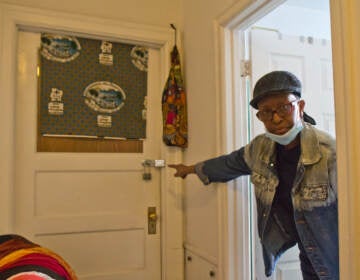GFS siblings want to help pair medical service dogs with soldiers suffering from PTSD
A trio of brothers has launched a grassroots campaign from their laptop computers in hopes of pairing every U.S. veteran suffering from post-traumatic stress disorder with a federally protected, medical service dog.
With the help of their mother Jessica, Turner, Sully and Owen Burns of Center City started “Good Dogs Heal” on Martin Luther King Day of Service.
Armed with a Facebook page, online petition and a self-created website, the Germantown Friends School students aim to raise awareness for the psychological condition. They’re also urging Congress to fund a request which they consider a relatively easy way to improve the lives of many.
“Since they were in the war and they fought for the country,” said 12-year-old Sully, “we should give them something because they give us so much.”
Not an inexpensive proposition
The boys were spurred into action after befriending a 20-year veteran suffering from PTSD.
The captain, whose name the family requested be withheld from this story, served tours in both Iraq and Afghanistan. He has expressed interest in having a canine companion to help him manage his symptoms which can include anxiety attacks, night terrors and severe agoraphobia, or a fear of leaving the home.
The price tag for one — up to $20,000 — is simply too high for him, however. It’s a barrier the brothers think shouldn’t exist.
“It’s kind of unfair that they’re basically not getting paid back at all for keeping the freedom of our country,” said Owen, 15.
Their effort has been further fueled by the addition of a much beloved dog to their Delancy Street home. Through Keeper, a Golden Retriever, the three have learned the wonders a dog can do for people, even those not suffering from PTSD.
Sandwiched between his mother and his older brother Sully on one of the family’s living room couches, 8-year-old Turner shared a story about a slip at school that required a few stiches. Keeper, sensing the injury, did not leave Turner’s side.
A connection clicked.
“They have somebody to keep them happy when they feel sad or to help them,” said Turner.
Bolstering exisiting efforts
It’s unclear if PTSD is currently more prevalent, but there are certainly more veterans being treated.
According to officials with the U.S. Department of Veterans Affairs, more than 470,000 vets were treated for PTSD in fiscal year 2011. In fiscal year 2006, that total sat at an estimated 270,000.
The V.A. has launched a pilot program to study the effects medical service dogs have on veterans suffering from PTSD.
The program, created following a Congressional push, will ultimately help cover the cost of training 230 dogs, which spans between 500 and 1,500 hours per dog.
After local organizations pair the federal money with other funding sources, the veterans don’t pay a dime.
Guardian Angels Medical Service Dogs, Inc., located in Florida, was one of the organizations selected to participate. Carol Borden, who founded the group, has seen first-hand the positive effect a medical service dog can have on a veteran suffering with PTSD. She’s been working with dogs for more than four decades.
“They really end up getting their life restored, their dignity, their independence back,” she said.
Their health-care costs are reduced, too. Borden noted that veterans diagnosed with PTSD can be prescribed upwards of 30 different medications. A medical service dog can, in some cases, drastically reduce that total, she said.
The benefits of having the dog, she added, are visible almost immediately.
How the dogs help
Michael Gaither, a beneficiary of the program, said he was surprised at how quickly his symptoms became less burdensome with a dog by his side. The dogs are permitted to go anywhere their owners travel — inside or outside.
“It’s really amazing,” said the 67-year-old Floridian and Vietnam-era vet, who served stateside.
About a year ago, Gaither, who also suffers from multiple sclerosis and is wheelchair bound, was matched with Honey, a German Shepherd. He had been struggling severely with PTSD for several years by that point, rarely leaving his home or even answering the phone. At times, he considered taking his own life.
Honey helped pull Gaither out of the troubling depths of the disorder.
“I can go out to restaurants, I can go out to Wal-Mart and I can go to the grocery store,” said Gaither. “I can talk to you on the telephone.”
In the evenings, Honey is trained to keep Gaither calm. When she realizes he is heading towards a night terror, she responds by gently waking him before it becomes a full-blown incident.
Honey also knows when to grab Gaither’s wife if he needs human help and can fetch him his socks and other items.
“It’s given me a lot of my life back that I had lost,” he said. “The dog was my very last hope.”
More petition signatures needed
Back in Philadelphia, the Burns boys are keeping a close eye on the online response to their push for pooches.
Their Facebook page is slowly picking up steam. Their “U.S. Senate: Provide service dogs to Veterans with Post Traumatic Stress Disorder” petition, posted on Change.org, has nearly 500 signatures as of May 24. The boys need to reach 10,000 before it is passed along to Congress.
It urges both chambers of the federal and state governments, Pennsylvania Gov. Tom Corbett, U.S. Rep. Rush Holt of central New Jersey, Secretary of Veterans Affairs Eric Shinseki and members of the U.S. Senate Armed Services Committee to get on board.
“Since the Federal Government accepted the service of each member of the American military, the Federal Government has a moral responsibility to do everything in its power to heal the wounds incurred in service, including psychological wounds,” reads a part of the petition.
The Burns will also continue to reach out to relevant organizations in an effort to garner more widespread support for their cause.
Jessica said she has already contacted more than 100 groups; among them are VoteVets.org, the Wounded Warrior Project and the Fisher House Foundation.
A number of the organizations contacted have mentioned Good Dogs Heal on their websites. Public, in-person advocacy for the campaign will come next, she said.
Nearly five months in, the family is optimistic their outreach will bring about change. They don’t plan on quitting “until the government starts buying dogs,” said Jessica.
WHYY is your source for fact-based, in-depth journalism and information. As a nonprofit organization, we rely on financial support from readers like you. Please give today.




